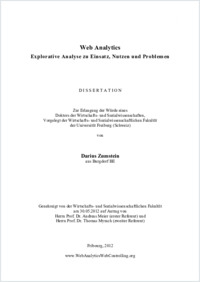Web Analytics : explorative Analyse zu Einsatz, Nutzen und Problemen
- Zumstein, Darius
- Meier, Andreas (Degree supervisor)
-
30.05.2012
XXX + 240 p.
Thèse de doctorat: Université de Fribourg, 2012
entreprise -- site World Wide Web - évaluation -- [document électronique]
audience (public) - mesure -- entreprise -- site World Wide Web -- [document électronique]
entreprise -- site World Wide Web - utilisation - mesure -- [document électronique]
analyse des données -- données statistiques -- entreprise -- site World Wide Web -- * méthodologie -- [document électronique]
English
German
In the Internet economy and information society, corporate websites have become an essential instrument of information, communication and business transactions. With the increasing Web usage and shift of transactions to the Web, analysing and controlling website usage and e-business – Web analytics – is increasingly being recognized as an important task for website operators and e-business management. Using client- and server-side data collection methods, each and every click of website users are trackable and analyzable by the means of Web analytics software. Besides analyzing website usage and user behavior, this allows the monitoring and optimization of the web-based value chain. Web analytics supports the performance measurement and improvement of online marketing activities (like campaigns, search engine optimization and keyword advertisement) and the ongoing optimization of the website regarding content, navigation and usability. These and further advantages have been shown by an empirical study among 740 German speaking Web analytics professionals. In 10 out of 11 cases, Web analytics helps to achieve website- and e-businessrelated goals, measuring various KPIs (key performance indicators). Generating leads, acquiring and binding customers, providing information, engaging with users and selling products or services turned out to be important goals. Structure equation models demonstrated that transactional metrics like conversion rates (the share of visitors who converted to buyers) are highly relevant, as well as data regarding traffic sources. Web analytics experienced and engaged companies are more marketing- and customeroriented, they better profit from the benefits and they have less application problems. However, the usage but not the technology of Web analytics is still in its infancy, for both business practice and academic research. The survey of this explorative research highlights that in most companies Web analytics is a part-time job and the potential value of Web analytics has not been yet fully recognized, especially by small and medium sized companies. Companies’ experience with Web analytics is still rather low and resources like budget, time and qualified staff are often missing. Although Web analytics is often assigned to the (online) marketing department, it is a highly interdisciplinary task. Therefore, interdisciplinary collaboration and communication in Web analytics is a challenge and data privacy remains one of the most critical problems.
Im Internetzeitalter ist der Webauftritt eines Unternehmens ein unverzichtbares Instrument der Information, Kommunikation und Transaktion geworden. Mit der stark steigenden Nutzung und der Abwicklung des Geschäfts über das Internet wird die Analyse und das Controlling der Website-Nutzung und des elektronischen Geschäfts – das Web Analytics – für Website-Betreiber eine wichtige Aufgabe. Dank client- und serverseitigen Datensammlungsmethoden kann jeder einzelne Klick der Besucher aufgezeichnet und mittels Web-Analytics-Software ausgewertet werden. Dies dient neben der Analyse der Website-Nutzung und des Besucherverhaltens der Steuerung und der Optimierung der webbezogenen Wertschöpfungskette. Als sozioökonomisches Informationssystem dient Web Analytics Unternehmen zur Wirksamkeitsmessung und Optimierung von Online-Marketing-Massnahmen (z.B. Werbekampagnen, Suchmaschinenoptimierung und -marketing) sowie bei der kontinuierlichen Verbesserung der Website hinsichtlich Inhalt, Navigation und Benutzerfreundlichkeit. Diese und weitere Nutzenvorteile konnten dank einer empirischen Untersuchung unter 740 Web-Analytics-Fachleuten gezeigt werden. So hilft Web Analytics bei 10 von 11 Befragten, geschäfts- und websitebezogene Ziele anhand von KPIs (Key Performance Indicators) zu messen und zu erreichen. Dabei sind Kundengewinnung und -bindung, die Informationsbereitstellung und die Transaktionsabwicklung über die Website zentrale Ziele. Die Strukturgleichungsmodellierung zeigte auf, dass transaktionsorientierte Kennzahlen wie die Konversionsrate (der Anteil an Besuchern, die zu Käufern konvertierten), am wichtigsten sind, genauso wie die Analyse der Traffic-Quellen. Web Analytics erfahrene und affine Unternehmen sind marketing- resp. kundenorientierter, sie schöpfen die Nutzenpotentiale eher aus und haben weniger Anwenderprobleme. Wie die Untersuchung zeigte, steckt Web Analytics nicht aus technischer, sondern aus der Anwendungssicht in Theorie und Praxis noch in den Kinderschuhen. Die Webanalyse wird in vielen Unternehmen nur als Nebenjob betrieben und oft mangelt es an Erfahrung sowie an Ressourcen wie Zeit, Budget und Know-how. Web Analytics wird organisatorisch meist dem (Online-)Marketing zugeordnet, ist jedoch eine fachübergreifende Aufgabe. Die interdisziplinäre Zusammenarbeit ist hierbei eine Herausforderung und der Datenschutz ist im Web Analytics ein kritisches Problem.
- Faculty
- Faculté des sciences économiques et sociales et du management
- Language
-
- German
- Classification
- Applied sciences
- Notes
-
- Ressource en ligne consultée le 05.07.2012
- License
-
License undefined
- Identifiers
-
- RERO DOC 29747
- URN urn:nbn:ch:rero-002-110995
- RERO R007099098
- Persistent URL
- https://folia.unifr.ch/unifr/documents/302498
Statistics
Document views: 700
File downloads:
- Texte intégral: 3403
